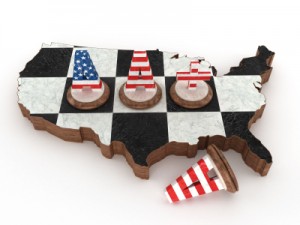Just a couple of days after Standard & Poor’s downgraded the U.S. credit rating for the first time in history, everyone was joining in the blame game on the Sunday morning news circuit. Democrats pointed a weak finger at S&P itself but saved most of its accusing finger wagging for the Tea Party.
 Former Vermont Gov. Howard Dean, who ran for president in 2004 and later led the Democratic National Committee, fired the first shot at Tea Party representatives on CBS’ Face the Nation. Speaking of their actions during the debate on raising the debt ceiling, he said, “They’ve been smoking some of that tea, not just drinking it.”
Former Vermont Gov. Howard Dean, who ran for president in 2004 and later led the Democratic National Committee, fired the first shot at Tea Party representatives on CBS’ Face the Nation. Speaking of their actions during the debate on raising the debt ceiling, he said, “They’ve been smoking some of that tea, not just drinking it.”
Senator John F. Kerry of Massachusetts, on NBC’s Meet the Press, laid full blame at the feet of Tea Party activists. “I believe this is, without question, the Tea Party downgrade.” David Axelrod, former senior adviser to President Obama, also called the credit rating drop the “Tea Party downgrade.”
One after another, the talking heads and Democrat spokesmen positioned themselves as reasonable, pragmatic leaders in contrast to conservative Republicans whom they framed as irresponsible ideologues who caused the downgrade by refusing to accept any new taxes. But David Beers, head of S&P’s government debt-rating unit, had a different viewpoint in his appearance on Fox News Sunday. “Congress and the administration are jointly responsible for the conduct of fiscal policy,” he observed, “so, this is not really about either political party.”
Though there are some good questions that need to be asked about S&P’s motivations for the downgrade, there is no doubt the revolving blame game in Washington helped lead to the U.S. federal government losing its AAA status. Part of S&P’s justification for the action was the political gridlock that continues to paralyze Washington. Beers noted, “Even with the agreement of Congress and the administration this past week … the underlying debt burden of the U.S. government is rising and will continue to do so most likely over the next decade.”
Tea Party representatives also had their defenders. Sen. Lindsey Graham, a South Carolina Republican, noted that without the movement, trillions of dollars in spending cuts wouldn’t be possible. Also appearing on Face the Nation, he said, “Thank God they’re here.” Graham went on to add:
This is the first time we’ve ever raised the debt ceiling where we tried to actually reduce spending. That’s a good thing, but we’re woefully short. The Tea Party hasn’t destroyed Washington. Washington was destroyed before the Tea Party got here. The hope is that the Tea Party and middle-of-the-road people can find common ground to turn this country around before we become Greece.
Some Democrats and Republicans weren’t so quick to blame the Tea Party or let S&P off the hook. On CNN’s State of the Union, Steve Forbes, former Republican presidential candidate and CEO of Forbes Inc., said the downgrade was “outrageous” and “a political move.” He expressed surprise at the way S&P was planning politics with the U.S. economy, observing the U.S. government would have no problem paying outstanding interest and principal on bonds.
 S&P came under fire for making a $2 trillion error it later corrected in its calculations of projected U.S. debt. Both side of the aisle have noted that Moody’s Investors Service and Fitch Ratings, the other two major ratings agencies, have made no downgrade move. Speaking on ABC’s This Week, Maryland Governor Martin O’Malley said, “They made a $2 trillion mistake. The other ratings agencies did not downgrade the U.S. debt because they did not make that $2 trillion mistake.”
S&P came under fire for making a $2 trillion error it later corrected in its calculations of projected U.S. debt. Both side of the aisle have noted that Moody’s Investors Service and Fitch Ratings, the other two major ratings agencies, have made no downgrade move. Speaking on ABC’s This Week, Maryland Governor Martin O’Malley said, “They made a $2 trillion mistake. The other ratings agencies did not downgrade the U.S. debt because they did not make that $2 trillion mistake.”
The nation’s best hope of avoiding another downgrade lies in the hands of a twelve-member “super-committee” required to find the cuts mandated by the twelfth-hour budget deal. Representative Paul Ryan of Wisconsin, architect of the 2012 Republican budget, doesn’t see much promise in the committee. “I wouldn’t call it super. … I’m not putting all my stock in this committee,” he said on Fox News Sunday. “I don’t think it’s going to be what fixes all of our fiscal problems. … Ultimately, I really think you need to change leadership in Washington if you want to fix this problem.”
Mr. Ryan believes the “super-committee” will identify between $1 trillion and $2 trillion in additional cuts, well below the $4 trillion threshold cited by S&P as necessary to place the nation back on firm financial footing.
Unless the blame game ends at the door when those twelve committee members meet, you can bet we are headed for Debt Crisis II in a hurry.
©2011 Off the Grid News
——————————————————————————————————
Is It Wrong To Make Money During Economic Hard Times?
Insider Secrets That Allow The “Little Guy” To Profit As The Economy Crumbles…
—————————————————————————————————–
 Off The Grid News Better Ideas For Off The Grid Living
Off The Grid News Better Ideas For Off The Grid Living



